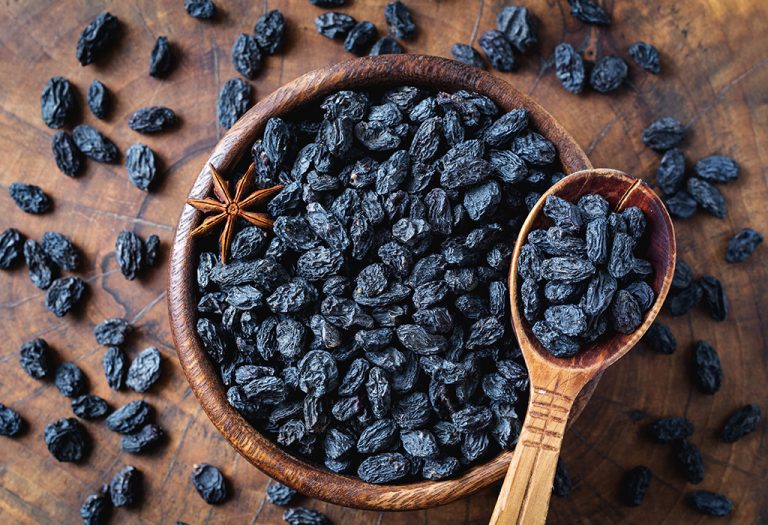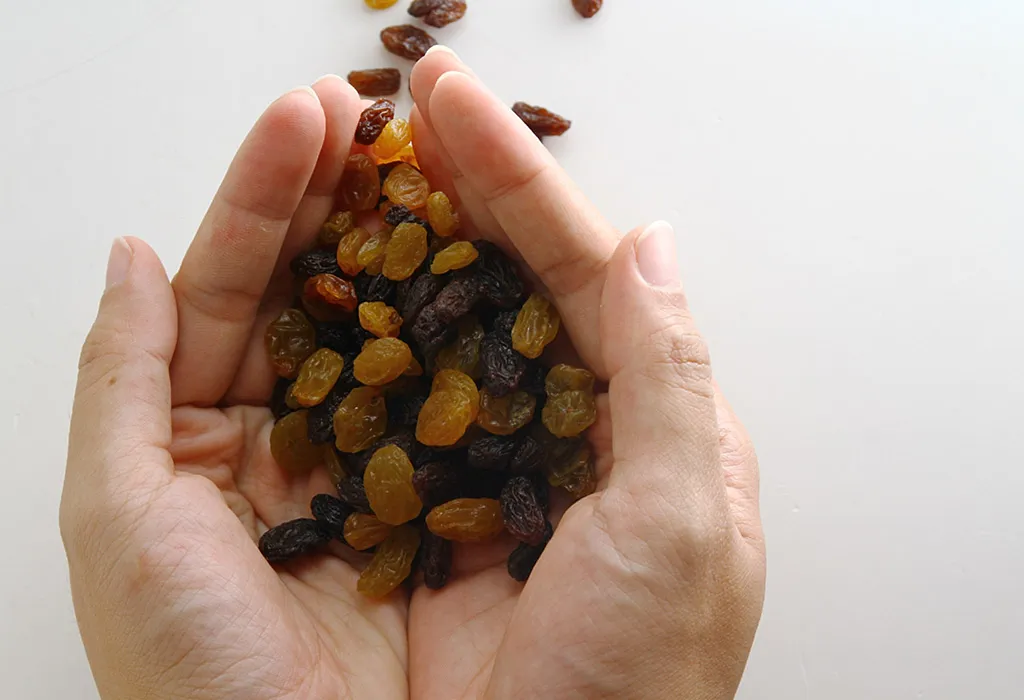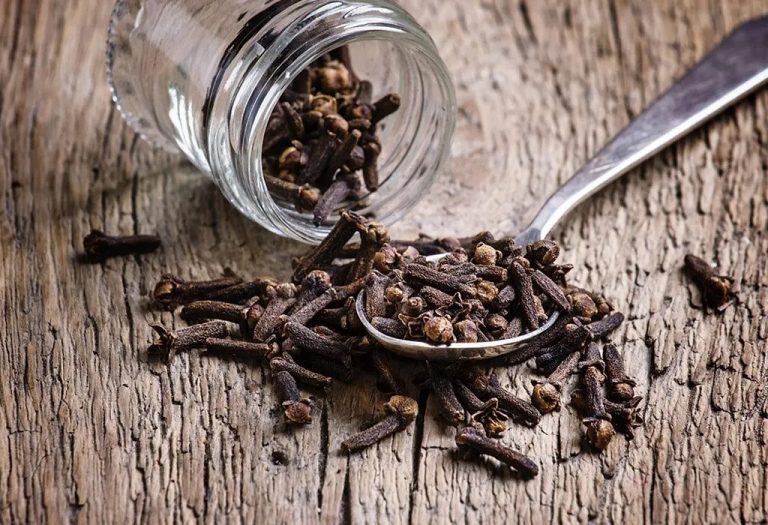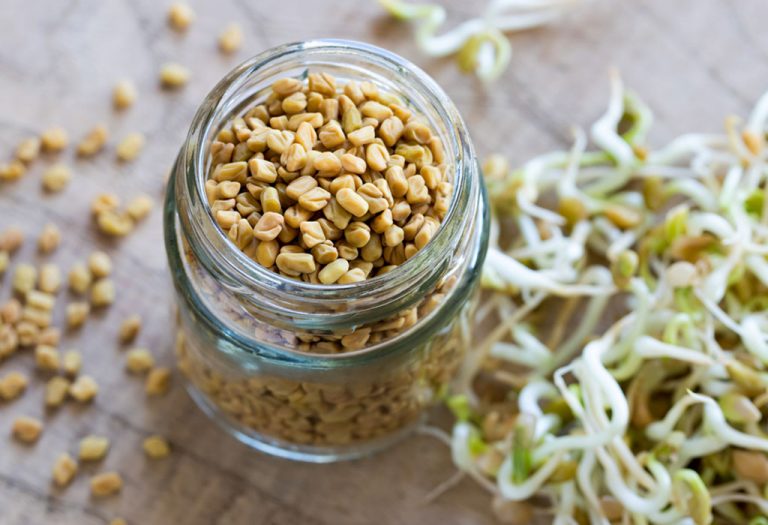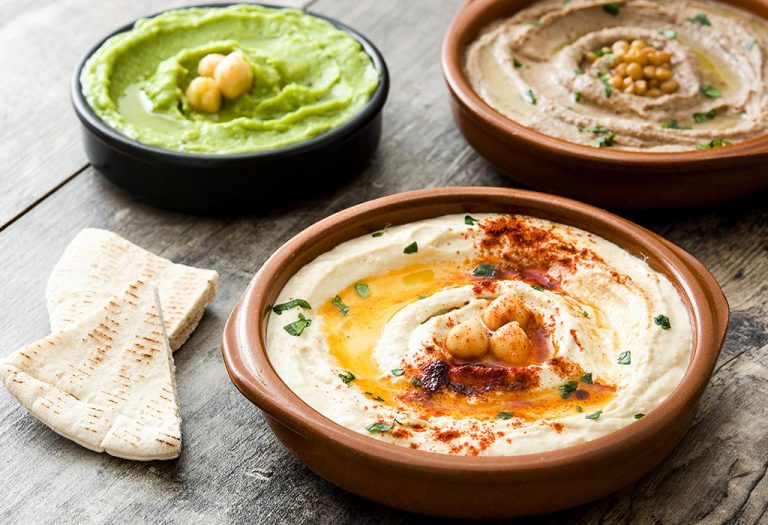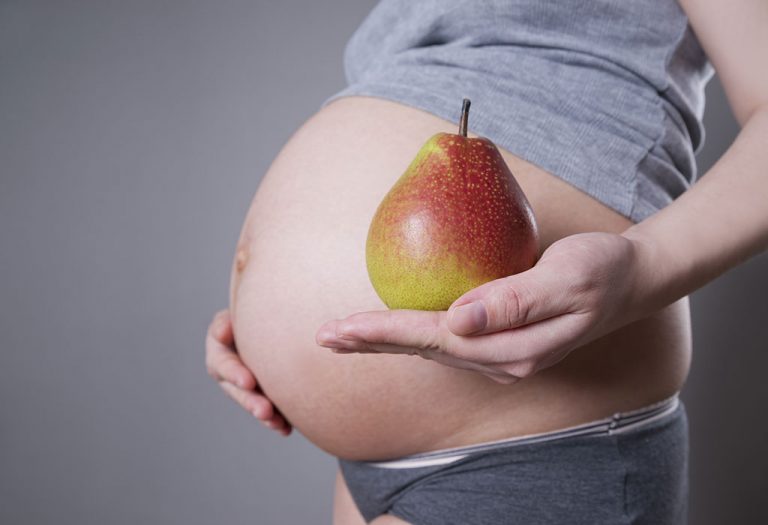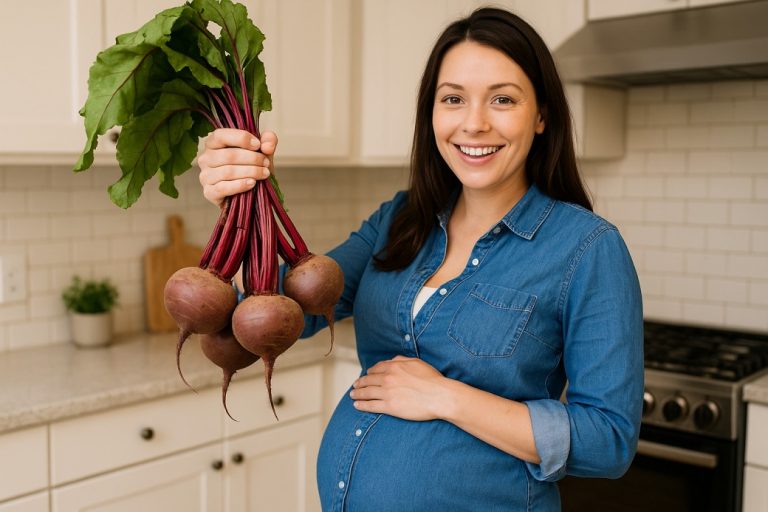Raisins During Pregnancy – Benefits, Side Effects, and Precautions

Raisins are loaded with health benefits, but does eating dry grapes during pregnancy benefits the baby or the mom? Let’s understand. When a woman is expecting, she is extremely careful about her diet. She thinks twice before putting eating anything, as she should, as it affects her baby’s health. If you are pregnant, we are sure you must be careful about your eating habits too. You are, after all, not just responsible for your nutrition and health but for your baby’s as well. Your doctor must have suggested that you start eating dry fruits and nuts along with other healthy foods. But can you eat raisins while pregnant? In this article, we will talk about raisins during pregnancy.
Is It Safe to Eat Raisins During Pregnancy?
It is completely safe to consume raisins in pregnancy. Dry black grapes are very nutritious, and consuming them during pregnancy can be very beneficial for the health of a pregnant woman. Let’s understand the nutritional value of raisins.
Nutrients in Raisins
Here is a list of nutrients present in raisins.
1. Fibre
Raisins are a rich source of fibre. They are easy to digest and can help keep your digestive system on track. Fibre is important for us, but it is all the more important for a pregnant woman. During pregnancy, a woman’s body struggles to break down food. Hormonal imbalances can cause numerous digestive issues, but raisins help regulate these.
2. Iron
Another significant benefit of eating raisins is that they are a source of iron. About a half cup of raisins contains 1.6 to 3 milligrams of iron (1). Iron is extremely important because it helps regulate blood flow, maintains heart health, and ensures that a healthy source of oxygen-carrying blood cells passes through the lungs. This makes sure your lungs work in a healthy manner. A deficiency in iron can cause a type of anaemia called iron-deficient anaemia.
3. Calcium
One of the most important minerals in your body is calcium. This mineral supports bone, dental, and heart health, as well as cholesterol absorption and skin health. It is required by your body to function correctly, and raisins are a rich source of calcium, too. In fact, calcium is twice as important for pregnant women as it is essential for the baby’s bone development in the womb. It ensures the baby’s bone density remains within normal limits and that bone development proceeds appropriately.
4. Potassium
Raisins also contain potassium, a vital mineral that helps maintain proper heart and muscle function. Potassium helps regulate blood pressure, balance fluids in the body, and support nerve signals. Adequate potassium intake is important for overall cardiovascular health and helps prevent conditions such as hypertension. Including raisins in your diet can be a tasty way to boost your potassium levels and promote a healthy cardiovascular system.
How Many Raisins Should You Eat While Pregnant?
Eating a handful of raisins a day can be extremely healthy for you. They can serve as a nutritious snack with tea or just when you are feeling low. However, raisins should be consumed in limited amounts. A small handful of raisins can be a quick go-to snack while working (2).
Benefits of Eating Raisins (Kishmish) During Pregnancy
Raisins offer numerous benefits for both the mother and the baby. During pregnancy, it is important to understand how the mother is affected by the consumption of raisins. Here are a few benefits of raisins during pregnancy for mothers-to-be.
1. Helps Improve Dental Health
Raisins are rich in calcium as well as oleanolic acid, both of which can help protect your teeth. Due to hormonal imbalances, your teeth can deteriorate during pregnancy, but raisins can help combat that with antibacterial activity and optimum oral pH (3).
2. Provides Relief From Constipation
Raisins are rich in fibre and have other laxative properties, so they help relieve constipation. Constipation during pregnancy is a common complaint among women, affecting about one-fourth of women throughout pregnancy, but eating raisins can provide quick relief (4). Eating raisins can help prevent and treat minor constipation (5).
3. Helps Increase Blood Cells
Raisins can boost the production of haemoglobin count in your body, which helps in the production of red blood cells in the body. When pregnant, your body undergoes a lot of trauma and changes, which can affect the production of red blood cells in your body. Eating raisins can tackle this problem with ease.
4. Strengthens the Digestive System
The high fibre content in raisins also helps improve the digestive function in the body. So eat a handful of raisins while pregnant and keep your digestive system healthy and happy!
5. Provides Energy
Raisins are known to be an extremely good source of natural glucose. Eating raisins when hungry can provide you with instant energy (6).
6. Prevents Anaemia
Hormonal imbalances and the lack of iron content in the body can lead to anaemia during pregnancy. In fact, anaemia is common during pregnancy. But iron-deficiency anaemia can be prevented by eating raisins. As raisins are a rich source of iron, including them in your daily diet can help prevent it to an extent (7).
7. Supports Bone Health
In addition to calcium, raisins also contain essential minerals like phosphorus and manganese, which play a crucial role in maintaining strong and healthy bones. During pregnancy, the demand for these minerals increases to support the developing skeletal system of the baby. Including raisins in your diet contributes to overall bone health for both the mother and the growing fetus.
8. Alleviates Nausea and Morning Sickness
Raisins contain natural compounds that may help alleviate nausea and morning sickness, common symptoms during the early stages of pregnancy. The natural sugars and fiber in raisins can provide a gentle, easily digestible source of energy, potentially helping ease feelings of nausea.
9. Regulates Blood Sugar Levels
Despite being sweet, raisins have a moderate glycemic index and can be a good option for satisfying sweet cravings without causing drastic spikes in blood sugar levels. Maintaining stable blood sugar levels is important during pregnancy, and raisins can be a healthier alternative to sugary snacks, helping to regulate glucose levels.
These additional benefits highlight the diverse positive impact that raisins can have on various aspects of maternal health during pregnancy.
Advantages of Eating Black Raisins When Pregnant
During pregnancy, incorporating black raisins into your diet can offer a multitude of benefits for both the expecting mother and the developing baby. Rich in essential nutrients, black raisins contribute to overall health and well-being during this crucial period. Here are some black raisins benefits in pregnancy:
- Black raisins are packed with antioxidants, such as anthocyanins and quercetin, which help neutralize free radicals in the body and promote cellular health.
- The vitamins and minerals in black raisins, including vitamin C and zinc, contribute to a strengthened immune system, providing added protection against common illnesses.
- The natural sugars in black raisins provide a sweet taste without the added sugars found in many processed snacks, making them a nutritious option for satisfying cravings without contributing to excessive weight gain.
- The potassium content in black raisins helps maintain healthy blood pressure levels, reducing the risk of hypertension during pregnancy.
- The presence of antioxidants and vitamins in black raisins contributes to healthy skin, reducing the likelihood of skin issues that may arise due to hormonal changes during pregnancy.
- The natural occurrence of serotonin in black raisins may help improve sleep quality, providing relief from insomnia or sleep disturbances commonly experienced during pregnancy.
- Black raisins contain phytochemicals that may help regulate hormonal imbalances, offering relief from symptoms such as mood swings and fatigue.
- The potassium content in black raisins contributes to maintaining fluid balance in the body, potentially reducing swelling, a common issue during pregnancy.
- Black raisins have a low glycemic index and may contribute to better blood sugar control, potentially lowering the risk of gestational diabetes, a condition that can affect pregnant women.
- The magnesium content in black raisins can help prevent and alleviate muscular cramps, a common discomfort during pregnancy. Magnesium is crucial for muscle function and relaxation.
Who Should Avoid Eating Raisins?
Although raisins are healthy, they can cause harm to those who have pre-existing conditions like diabetes or blood-sugar-related illnesses. If you have gestational diabetes or any other medical problem, it is recommended that you consult a physician to find other natural alternatives to raisins.
Side Effects of Eating Raisins While Pregnant
There is nothing wrong with consuming raisins and pregnancy is a great time to add them to your diet. However, eating too many raisins can be detrimental to your health. Excess consumption of anything is detrimental to health, and the same goes for raisins. Below are some side effects of excess consumption of raisins for pregnant women:
- Eating too many raisins can raise your blood sugar levels.
- Eating raisins in excessive amounts can cause gestational diabetes.
- They can cause type 2 diabetes in your baby.
Ways to Include Raisins in Your Pregnancy Diet
Incorporating raisins into your pregnancy diet is a delicious way to reap the numerous health benefits they offer for both you and your baby. Here are some creative and enjoyable ways to include raisins in your daily meals during pregnancy:
- Sprinkle a handful of raisins on your morning cereal, oatmeal, or yogurt for added sweetness, texture, and a nutritional boost.
- Create your own trail mix by combining raisins with nuts, seeds, and whole-grain cereals.
- Toss a handful of raisins into your salads or grain bowls to introduce a sweet contrast to savory flavors.
- Incorporate raisins into homemade baked goods such as muffins, cookies, or energy bars.
Delicious Pregnancy-safe Raisin Recipes
Embracing a nutritious and delicious pregnancy diet is essential for both the mother’s well-being and the healthy development of the baby. Here are some delightful and pregnancy-safe raisin recipes that not only cater to your cravings but also provide essential nutrients for a thriving pregnancy.
1. Raisin and Nut Oatmeal Delight
This nutty raisin oatmeal dish is the equivalent of a warm hug. Try it out, yourself!
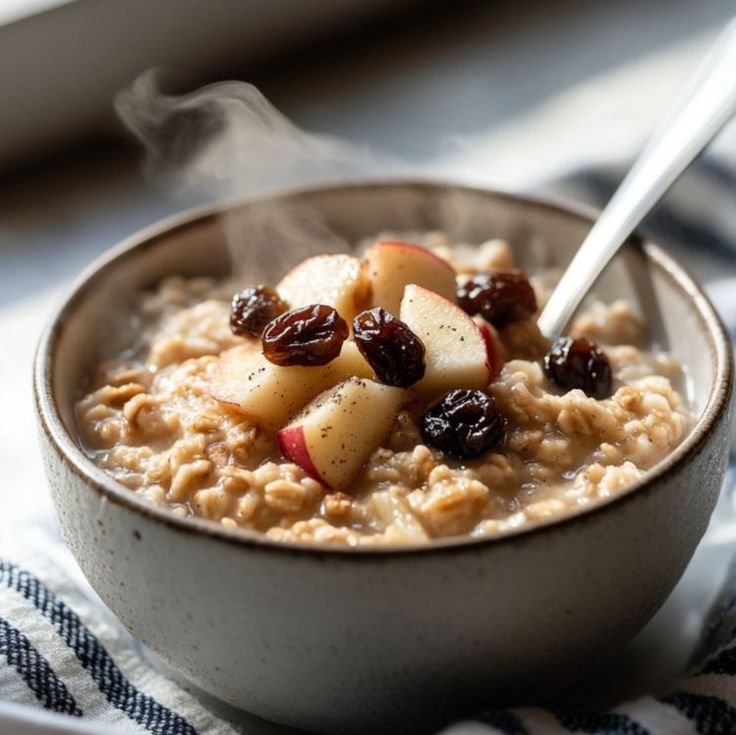
Image Credit: Pinterest
Ingredients:
- 1/2 cup rolled oats
- 1 cup milk or a plant-based alternative
- 2 tablespoons raisins
- 1 tablespoon chopped nuts (almonds, walnuts, or your choice)
- 1 teaspoon honey or maple syrup (optional)
- Pinch of cinnamon
Preparation time: 5 minutes
Cooking time: 10 minutes
Total time: 15 minutes
Method:
-
In a saucepan, combine rolled oats and milk. Bring to a simmer over medium heat.
- Stir in raisins and chopped nuts. Continue cooking until the oats are tender and the mixture has thickened.
- Remove from heat, add honey or maple syrup if desired, and sprinkle with cinnamon.
- Serve warm, and enjoy a hearty and nutritious breakfast!
2. Raisin and Yogurt Parfait
Refrigerated yoghurt parfait garnished with raisins and berries hits a different level of cravings! Filling, nutritious, and simple to make, this recipe is going to be your go-to snack for your pregnancy.

Image Credit: Pinterest
Ingredients:
- 1 cup Greek yogurt
- 1/4 cup raisins
- 1/4 cup granola
- Fresh berries (strawberries, blueberries)
- Drizzle of honey
Preparation time: 10 minutes
Total time: 10 minutes
Method:
- In a glass or bowl, layer Greek yogurt, raisins, and granola.
- Add fresh berries on top of the granola layer.
- Drizzle with honey for added sweetness.
- Repeat the layers as desired.
- Refrigerate for a refreshing and satisfying parfait.
3. Cinnamon Raisin Muffins
Cinnamon raisin muffins are just the mood-buster you need whenever you feel low during your pregnancy. Yep, the sweet smell of the muffins baking relieves half the mood. Don’t believe us? Try it yourself!

Image Credit: Pinterest
Ingredients:
- 2 cups all-purpose flour
- 1/2 cup sugar
- 1 tablespoon baking powder
- 1/2 teaspoon salt
- 1 cup milk
- 1/3 cup vegetable oil
- 1 large egg
- 1 teaspoon vanilla extract
- 1 cup raisins
- 1 teaspoon ground cinnamon
Preparation time: 15 minutes
Cooking time: 20 minutes
Total time: 35 minutes
Method:
- Preheat the oven to 375°F (190°C) and line a muffin tin with paper liners.
- In a large bowl, whisk together flour, sugar, baking powder, and salt.
- In a separate bowl, combine milk, vegetable oil, egg, and vanilla extract.
- Add the wet ingredients to the dry ingredients and stir until just combined. Fold in raisins and cinnamon.
- Spoon the batter into muffin cups and bake for 18-20 minutes or until a toothpick inserted comes out clean.
- Allow the muffins to cool before serving.
4. Quinoa Salad With Raisins and Veggies
Feeling low energy during your pregnancy? This quinoa salad, topped with raisins and veggies, is an absolute strength-booster!
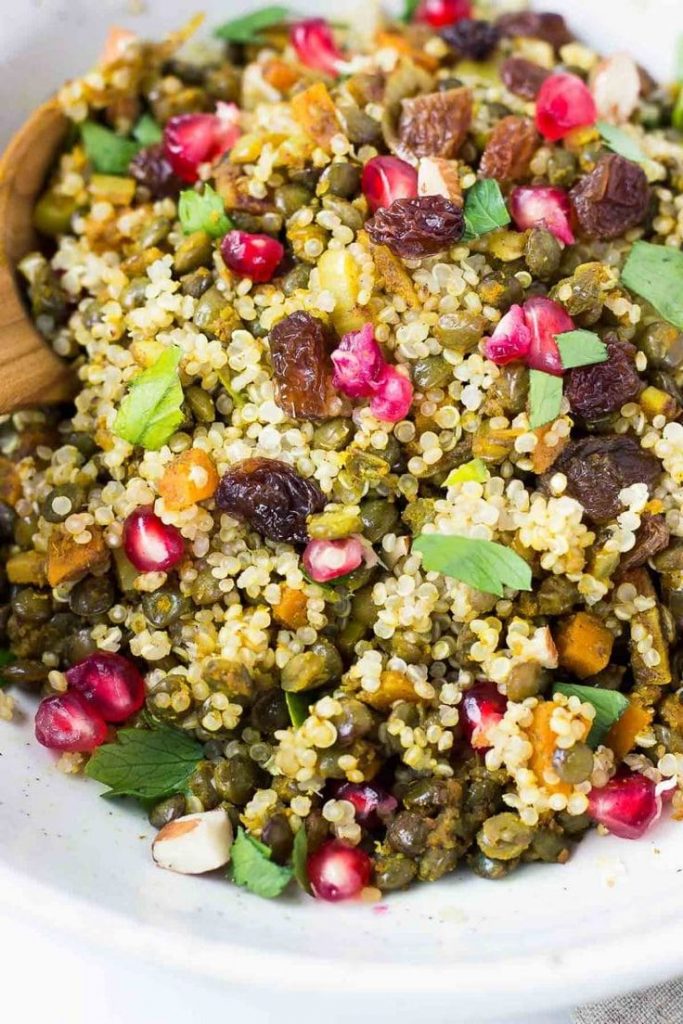
Image Credit: Pinterest
Ingredients:
- 1 cup cooked quinoa
- 1/4 cup raisins
- 1/2 cucumber, diced
- 1/2 red bell pepper, diced
- 1/4 cup feta cheese, crumbled
- 2 tablespoons olive oil
- 1 tablespoon balsamic vinegar
- Salt and pepper to taste
Preparation time: 20 minutes
Total time: 20 minutes
Method:
- In a large bowl, combine cooked quinoa, raisins, cucumber, red bell pepper, and feta cheese.
- In a small bowl, whisk together olive oil, balsamic vinegar, salt, and pepper.
- Drizzle the dressing over the quinoa mixture and toss until well-coated.
- Serve chilled as a refreshing and nutrient-packed salad.
Alternatives to Raisins During Pregnancy
Consuming raisins during pregnancy’s first, second, and third trimesters is safe. However, if you don’t like the taste of raisins in general or have just become averse to raisins during your pregnancy due to taste bud changes, here are some nutritious alternatives you can try:
- Prunes – Rich in fibre and improve digestion
- Dried cranberries – Tasty; low sugar content; rich in antioxidants
- Dried apricots – Rich in iron; energy booster; perfect snack option
- Figs – Calcium-rich; sweet taste
- Banana chips – Perfect savory snacks; rich in potassium
FAQs
1. Can pregnant women eat soaked black raisins?
Yes, pregnant women can eat soaked black raisins. Soaking raisins can make them easier to chew and digest. It also enhances their natural sweetness, providing a tasty and nutritious snack. Additionally, consuming soaked raisins during pregnancy offers various health benefits, including improved digestion and hydration.
2. Will I be allergic to raisins in pregnancy?
While allergies are possible, raisins are generally well-tolerated during pregnancy. Allergic reactions to raisins are rare, but if you have a known allergy to grapes or dried fruits, it’s advisable to consult with your healthcare provider. If you experience any unusual symptoms after consuming raisins, such as itching, swelling, or difficulty breathing, seek medical attention promptly.
3. Is it safe to eat raisins with milk when pregnant?
Yes, it is safe for pregnant women to eat raisins with milk. Combining raisins with milk creates a nutritious and wholesome snack or a meal addition. The calcium in milk complements the iron content in raisins, promoting bone health and aiding in the prevention of iron-deficiency anaemia. However, if you have any dietary concerns or specific health conditions, it’s recommended to consult with your healthcare provider for personalized advice.
4. Can pregnant women with gestational diabetes eat raisins?
Raisins are high in sugar, the consumption of which could elevate blood sugar levels. Although raisins are loaded with health benefits, their consumption when you are diagnosed with gestational diabetes should be done after a doctor’s consultation.
Thinking about consuming raisins during pregnancy’s third trimester, and for that matter even the first trimester and second? Raisins for pregnant women are safe when consumed in moderation and can be an extremely healthy snack. Eating them in moderate amounts can provide you with energy and revitalise your system during pregnancy. But consult your doctor before including them in your pregnancy diet. Have a healthy diet that comprises veggies, fruits, and dry fruits and nuts – it will ensure that you have a healthy pregnancy. Stay happy and fit – and you will have a healthy pregnancy!
Also Read:
Mangoes during Pregnancy
Kiwi Fruit when Pregnant
Consuming Grapes in Pregnancy
Eating Apples while Pregnant
Was This Article Helpful?
Parenting is a huge responsibility, for you as a caregiver, but also for us as a parenting content platform. We understand that and take our responsibility of creating credible content seriously. FirstCry Parenting articles are written and published only after extensive research using factually sound references to deliver quality content that is accurate, validated by experts, and completely reliable. To understand how we go about creating content that is credible, read our editorial policy here.
1. UCSF Health – Anemia and Pregnancy
2. American University of Beirut Medical Center – Women’s Health: Nutrition During Pregnancy
3. PubMed Central – Is Eating Raisins Healthy?
4. PubMed Central – Constipation in pregnancy: prevalence, symptoms, and risk factors
5. University of Rochester Medical Center – Constipation
6. University of Michigan Health System – Healthy Snacking During Pregnancy
7. PubMed Central – Grape Products and Oral Health






